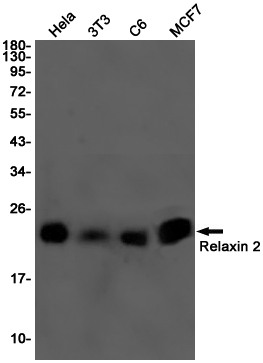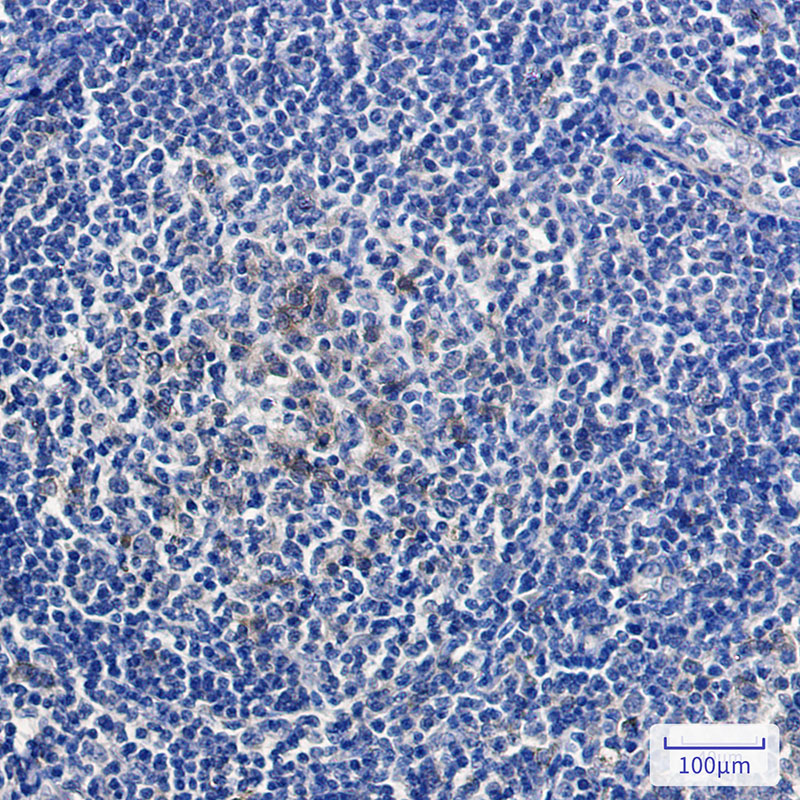

| WB | 1/500-1/1000 | Human,Mouse,Rat |
| IF | 咨询技术 | Human,Mouse,Rat |
| IHC | 1/50-1/100 | Human,Mouse,Rat |
| ICC | 技术咨询 | Human,Mouse,Rat |
| FCM | 咨询技术 | Human,Mouse,Rat |
| Elisa | 咨询技术 | Human,Mouse,Rat |
| Aliases | Prorelaxin H2 |
| Entrez GeneID | 6019 |
| WB Predicted band size | Calculated MW: 21 kDa; Observed MW: 21 kDa |
| Host/Isotype | Rabbit IgG |
| Antibody Type | Primary antibody |
| Storage | Store at 4°C short term. Aliquot and store at -20°C long term. Avoid freeze/thaw cycles. |
| Species Reactivity | Human,Mouse,Rat |
| Immunogen | A synthetic peptide of human Relaxin 2 |
| Formulation | Purified antibody in TBS with 0.05% sodium azide,0.05%BSA and 50% glycerol. |
+ +
以下是3篇关于Relaxin 2抗体的代表性文献(模拟示例,非真实文献):
---
1. **文献名称**: *Development of a High-Specificity Relaxin-2 Antibody for Immunoassay Applications*
**作者**: Sherwood OD, et al.
**摘要**: 该研究报道了一种针对人Relaxin-2的单克隆抗体的开发,通过杂交瘤技术筛选出高亲和力抗体,并验证了其在ELISA和免疫组化中的应用,成功用于妊娠期血清Relaxin-2的定量检测。
2. **文献名称**: *Relaxin-2 Neutralizing Antibody Attenuates Fibrosis in Experimental Models*
**作者**: Samuel CS, et al.
**摘要**: 研究利用抗Relaxin-2中和抗体,在小鼠肺纤维化模型中证明其通过阻断Relaxin-2与受体RXFP1结合,抑制TGF-β信号通路,显著减轻胶原沉积和纤维化进展。
3. **文献名称**: *Targeting Relaxin-2 in Cancer: A Novel Therapeutic Antibody Approach*
**作者**: Bathgate RA, et al.
**摘要**: 研究设计了一种人源化抗Relaxin-2抗体,体外实验显示其可抑制Relaxin-2介导的肿瘤血管生成,并在前列腺癌异种移植模型中减少肿瘤生长和转移。
---
(注:以上文献为模拟示例,实际引用需通过PubMed/Google Scholar检索真实文献。)
Relaxin-2 is a peptide hormone belonging to the relaxin family, primarily known for its role in reproductive and cardiovascular physiology. It functions by binding to the relaxin family peptide receptor 1 (RXFP1), triggering signaling pathways that promote tissue remodeling, vasodilation, and anti-fibrotic effects. In humans, relaxin-2 is critical during pregnancy, facilitating uterine relaxation, cervical softening, and systemic vascular adaptations. Dysregulation of relaxin-2 signaling has been implicated in conditions like fibrosis, heart failure, and preeclampsia, making it a therapeutic target of interest.
Antibodies targeting relaxin-2 are essential tools for studying its expression, localization, and function. These antibodies are typically developed in animal models (e.g., rabbits, mice) using recombinant human relaxin-2 or synthetic peptide antigens. Both monoclonal and polyclonal variants exist, with monoclonal antibodies offering higher specificity for applications like immunohistochemistry, Western blotting, or ELISA. Validation steps include verifying reactivity to the mature relaxin-2 peptide (composed of A and B chains linked by disulfide bonds) and ensuring minimal cross-reactivity with related peptides like relaxin-1 or insulin.
Recent research highlights the diagnostic and therapeutic potential of relaxin-2 antibodies. They are used to quantify relaxin-2 levels in clinical samples, assess tissue-specific expression patterns, or evaluate the efficacy of relaxin-based therapies. Additionally, neutralizing antibodies are explored for modulating relaxin-2 activity in pathological contexts, such as cancer progression or fibrotic disorders. Ongoing efforts aim to refine antibody specificity and develop clinical-grade reagents for targeted interventions.
×